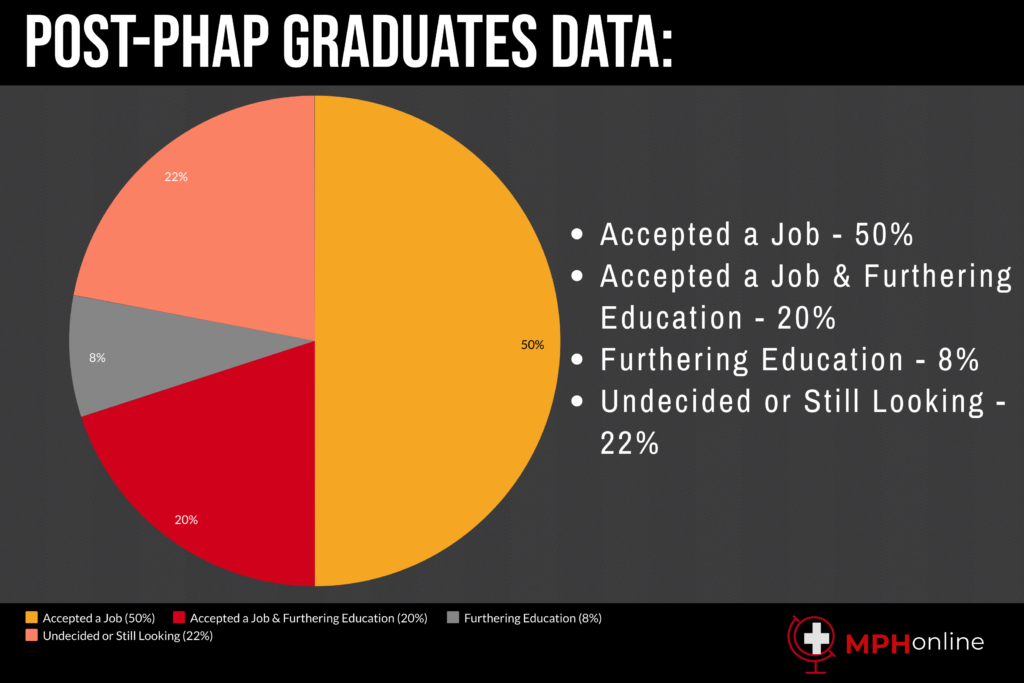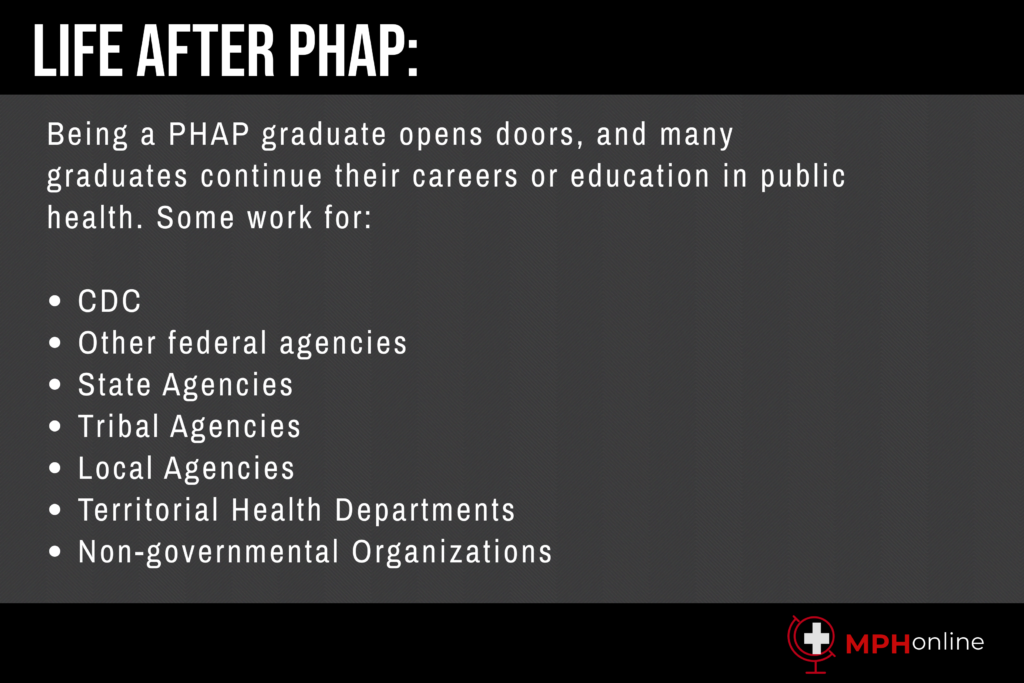For those looking for paid training in public health, the CDC PHAP program opens up numerous opportunities to do important work in underserved communities. Participants in this program come from many different types of backgrounds. From liberal arts majors to graduates with a hard science degree, applicants from a broad spectrum of educational backgrounds can find a place in the program. competition in the program is fierce and many people apply multiple years in a rope before getting accepted.
Learn more about what CDC PHAP graduates do after completing the program and how much money they can make at different stages in the CDC PHAP program.

What Is the CDC PHAP?
The Public Health Associate Program or PHAP offers paid training to participants. The Centers for Disease Control and Prevention runs the competitive program. As part of the PHAP, participants work for both governmental and nongovernmental public health and other organizations in the United States or its territories. Associates gain invaluable professional experience and work alongside experts in their fields. Exposure to different public settings further expands the experience and skill set of participants.
There are numerous benefits for those who are accepted to the program. The free hands-on training allows participants to expand their skill set and gives them a firm foundation in public health. During the two-year program, participants serve communities in need and build their public health careers. Further, once students complete their commitment, they often qualify for jobs at various public and private health agencies. This is also a great way to get your foot in the door if you want to work for the CDC or another government agency.
Prospect college students and new graduates can learn more about the program at the CDC Public Health Associate Program website.
What is the Purpose of the PHAP?
The PHAP fellowship provides a way for public health graduates or aspiring public health workers can enter the field without paying for a formal degree. Entrance to the program is highly competitive as accepted candidates receive a salary for the two year fellowship. Graduates of the PHAP where can a number of different public health spaces including the following:
- Tribal organizations
- Local communities
- U.S. territories
During their tenure in the program, participants work alongside experts in the field. This gives them critical exposure to how these agencies operate and form the basis of a competent career in public health.
Those with a college degree such as a BA or BS receive preferential treatment in the application process. Recent graduates have the best chance of becoming a PHAP associate. In return for their time, associate’s get first-hand experience working on disease prevention with professionals who have many years of experience. Most associates work in numerous settings as part of their training.
Those who win a fellowship become CDC assignees. They work in agencies across the government involved in public health policy and administration. Further, these positions are functionally identical to many other positions within the host agencies. That means that coworkers typically cannot distinguish PHAP associates from other positions within the department.
Applicants who successfully complete the program become eligible for open government public health positions. They also have already achieved a unique skill set that adds value to any future employers.
How Does the PHAP Impact My Career?
The Public Health Associate Program Has a tremendous impact on future careers for those who complete the program. As mentioned above, the competency-based training program gives participants a chance to receive paid, on-the-job training in crucial public health roles.
Here is a closer look at the benefits of the PHAP in terms of career growth:
- Participants are treated as employees, meaning that they not only receive a salary but also get a full benefits package. Where else can you find career training with paid vacation and sick leave as well as health insurance benefits? There are also numerous support services and resources available to associates.
- Develop career skills and receive free on the job training as you help clients in underserved communities.
- The program offers opportunities to serve in remote areas such as U.S. territories. This provides a unique opportunity to grow and expand your skillset while obtaining diverse public health experience.
- Mentorship from current CDC employees and the chance to gain crucial networking contacts.
The PHAP often appeals to those who would like the opportunity to work with experts in public health and receive career mentorship from current government employees.
For those who want to make a contribution in the public health sphere, this is a great way to begin. Those who win the fellowship are recognized as CDC employees and carry the prestigious organization on their resume throughout their careers.

Where Do Participants Go After PHAP?
As seen in previous sections, the CDC PHAP program opens a number of doors. Graduates can continue their careers in a number of ways including the following:
- Continue their education at the master’s or doctoral level
- Seek private or government opportunities in public health
- Continue to work for state, local, or tribal governments
- Seek positions in governmental health departments
The PHAP provides a firm foundation for those who wish to obtain a master of public health. This fellowship provides important experience that can help graduates obtain leadership positions in the field immediately after the program or upon receiving their master’s degree.
PHAP is meant to create a pool of public health professionals that improve the industry and lead the next generation of public health policy workers. Many host sites are understaffed due to their location or budget restrictions. This gives associates exposure to a number of different settings and challenges. Participants learn public health concepts in addition to the knowledge to perform their assigned roles. Just like any other job, these positions include orientation and opportunities for advanced training. Training opportunities occur in person at CDC facilities or as part of online coursework.
For applicants who want a wide variety of training and to develop competencies in various aspects of public health, there are plenty of opportunities. The fellowship training programs include standard program requirements but also allow customization to enhance associates’ performance at their host site. Upon arrival at their assigned organization, associates typically work in a specific area determined by the management of the host location.
All of this preparation can lead to a number of opportunities upon graduation. Some host sites hire PHAP graduates directly. Skill sets obtained during the fellowship make graduates highly attractive to government and private employees.
Roles help by recent PHAP graduates include the following:
- Public health science
- Analytics and assessment
- Program planning, management, and improvement
- Public health policy and law administration
- Community public health
- Public health financial management
CDC PHAP Salary
CDC PHAP salary is determined by the government’s federal pay grades.
New associates typically begin at GS-5, as defined it the General Schedule (GS) payscale. This adheres to the standard used to set the salaries of civilian government positions. This is considered an entry-level role. Currently, GS-5 employees start at $30,000 and can make a maximum of $39,149. This equates to $14.43 per hour.
While the salary may not seem that lucrative, it gives associates an opportunity to enter public administration immediately without obtaining an advanced degree. some applicants also come from other disciplines and use this as an opportunity to change their career without immediately going back to school.
Those interested in how the GS-5 rate adjusts for regionality can consult with the General Schedule pay calculator.
Some PHAP positions start out at GS-7. This is the 7th level of the General Schedule (GS) payscale, also considered entry-level pay. The GS-7 pay grade is higher than GS-5, which represents the fifth level of pay on the General Schedule.
GS-7 Is the starting grade for those who work as engineers, scientist,s and technical employees of the government. It typically applies to those who have just recently graduated with a bachelor’s degree. For example, the graduates of the Pathways Internship Program also begin with GS-7 designations.
GS-7 starts at $37,301.00 and maxes out at $48,488.00 (Step 10). This equates to $17.87 per hour.
What About Host Sites?
PHAP graduates who want to underserved communities can get their foot in the door through the program.
PHAP Matches up early career professionals with local, state, tribal, and other public health agencies. Host sites may be governmental or non-governmental organizations. This includes public health and academic institutions. It’s a great opportunity for those who want to continue their training and education prior to committing to a permanent public health position.
Host sites also received numerous benefits from the program, which is funded by the CDC. Associates are energetic, well rounded, and career-minded and often bring an outside perspective to remote agencies.
This unique partnership provides opportunities to take your skills where they are most needed and to network with career public administration officials and employees. For applicants looking for online learning opportunities paid for by their employers, this is a great choice. PHP associates are expected to attend yearly classes both at the CDC itself and through online education platforms.
Related: